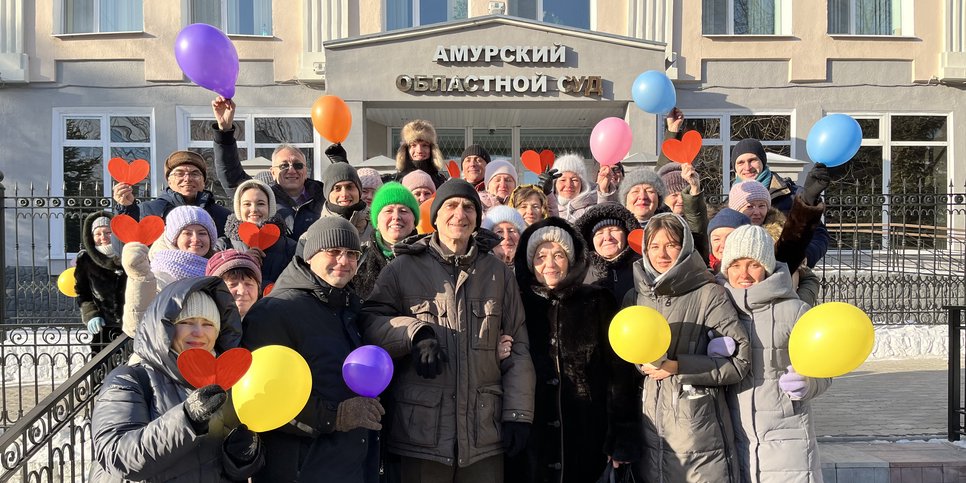Vladimir Balabkin with family and friends in front of the Amur Regional Court, December 2023
Vladimir Balabkin with family and friends in front of the Amur Regional Court, December 2023
Court of Appeal in Blagoveshchensk Mitigated the Punishment for Pensioner Vladimir Balabkin and Released Him from Custody
Amur RegionOn December 19, 2023, the Amur Regional Court released 71-year-old Vladimir Balabkin from custody. The court reclassified his actions from Part 1 (organizing extremist activity) to Part 2 (participating in such) of Article 282.2 of the RFCrC and imposed a 1-year suspended sentence. Before that he had spent 96 days in a pretrial detention center.
A panel of three judges chaired by Natalya Trofimova considered an appeal against the verdict of the court of first instance, which found Vladimir Balabkin guilty under Article 282.2(1) of the RFCrC. The more lenient second part of the same article allowed for the actions of the believer to be reclassified and for him to be released from custody in the courtroom. His sentence is suspended.
Three months earlier, Natalya Kramar, judge of the Belogorsk City Court of first instance, sentenced the elderly believer who has a hearing impairment and a serious stomach issue to 4 years in a penal colony. Immediately after the verdict was announced, Vladimir was arrested in the courtroom, and before the appeal he was in pretrial detention center No.1 in the Amur Region.
The believer disagreed with the guilty verdict, found many violations in it and appealed. He drew attention to the fact that it was impossible to establish from the verdict on what basis the court considered the usual worship of Jehovah's Witnesses as a continuation of the activity of an extremist organization. According to the explanation of the Supreme Court practicing the religion of Jehovah's Witnesses is allowed in Russia.
Balabkin also stressed that the verdict was passed in violation of international law: "For example, the court did not apply the provisions of Article 18 of the International Covenant on Civil and Political Rights, according to which everyone has the right to freedom of thought, conscience and religion. This right includes ... freedom to practice one's religion and belief, either individually or jointly with others and in public or private."
In the Amur Region, 13 of Jehovah's Witnesses have already received from 6 to 8 years in a penal colony for participating in meetings for worship.

